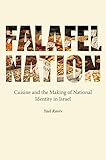Falafel nation : cuisine and the making of national identity in Israel / Yael Raviv.
Material type: TextSeries: Publication details: Lincoln, NB ; London : University of Nebraska Press, (c)2015.Description: 1 online resourceContent type:
TextSeries: Publication details: Lincoln, NB ; London : University of Nebraska Press, (c)2015.Description: 1 online resourceContent type: - text
- computer
- online resource
- 9780803290211
- 9780803290235
- TX724 .F353 2015
- COPYRIGHT NOT covered - Click this link to request copyright permission: https://lib.ciu.edu/copyright-request-form
| Item type | Current library | Collection | Call number | URL | Status | Date due | Barcode | |
|---|---|---|---|---|---|---|---|---|
 Online Book (LOGIN USING YOUR MY CIU LOGIN AND PASSWORD)
Online Book (LOGIN USING YOUR MY CIU LOGIN AND PASSWORD)
|
G. Allen Fleece Library ONLINE | Non-fiction | TX724 (Browse shelf(Opens below)) | Link to resource | Available | ocn921988915 |
Browsing G. Allen Fleece Library shelves, Shelving location: ONLINE, Collection: Non-fiction Close shelf browser (Hides shelf browser)
Revision of the author's thesis (doctoral)--New York University, 2002.
"When people discuss food in Israel, their debates ask politically charged questions: Who has the right to falafel? Whose hummus is better? But Yael Raviv's Falafel Nation moves beyond the simply territorial to divulge the role food plays in the Jewish nation. She ponders the power struggles, moral dilemmas, and religious and ideological affiliations of the different ethnic groups that make up the "Jewish State" and how they relate to the gastronomy of the region. How do we interpret the recent upsurge in the Israeli culinary scene--the transition from ideological asceticism to the current deluge of fine restaurants, gourmet stores, and related publications and media?Focusing on the period between the 1905 immigration wave and the Six-Day War in 1967, Raviv explores foodways from the field, factory, market, and kitchen to the table. She incorporates the role of women, ethnic groups, and different generations into the story of Zionism and offers new assertions from a secular-foodie perspective on the relationship between Jewish religion and Jewish nationalism. A study of the changes in food practices and in attitudes toward food and cooking, Falafel Nation explains how the change in the relationship between Israelis and their food mirrors the search for a definition of modern Jewish nationalism."--
"Examines the role of food in the construction of the Jewish nation, using food from field to table as a lens through which to understand Israeli history, society, and politics"--
Includes bibliographies and index.
1. Putting Down Roots: Agricultural Labor and Icons -- 2. Patriotic Distribution: The "Hebrew" Watermelon -- 3. Kitchen Lessons: Educating Home Cooks -- 4. The Virtual Kitchen: Making Room for Pleasure -- 5. The Professional Kitchen: Articulating a National Cuisine -- 6. No Table Required: Consumption and the Public Sphere -- Conclusion -- Appendix: Historical Context.
COPYRIGHT NOT covered - Click this link to request copyright permission:
There are no comments on this title.






